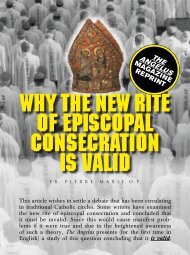Is Feeneyism Catholic? - Society of St. Pius X
Is Feeneyism Catholic? - Society of St. Pius X
Is Feeneyism Catholic? - Society of St. Pius X
Create successful ePaper yourself
Turn your PDF publications into a flip-book with our unique Google optimized e-Paper software.
T HE TEACHING OF THE CHURCH 65<br />
second will also have to suffer, but less, because it was not so<br />
much through wickedness as through folly that they wrought<br />
their failure; and that the third will be neither glorified nor punished<br />
by the righteous Judge, as unsealed and yet not wicked, but<br />
persons who have suffered rather than done wrong. For not every<br />
one who is not bad enough to be punished is good enough<br />
to be honored; just as not every one who is not good enough to<br />
be honored is bad enough to be punished. And I look upon it as<br />
well from another point <strong>of</strong> view. If you judge the murderously<br />
disposed man by his will alone, apart from the act <strong>of</strong> murder,<br />
then you may reckon as baptized him who desired baptism apart<br />
from the reception <strong>of</strong> baptism. But if you cannot do the one how<br />
can you do the other? I cannot see it. Or, if you like, we will put<br />
it thus: If desire in your opinion has equal power with actual<br />
baptism, then judge in the same way in regard to glory, and you<br />
may be content with longing for it, as if that were itself glory.<br />
And what harm is done you by your not attaining the actual glory,<br />
as long as you have the desire for it?<br />
§24: Therefore since you have heard these words, come forward<br />
to it, and be enlightened. 96<br />
The whole discourse is an exhortation to receive baptism.<br />
One must remember that, after the end <strong>of</strong> the persecutions, there<br />
were many converts; but, with less fervor than in previous times,<br />
some <strong>of</strong> these converts were falling into grievous sins and they<br />
found out that the Church was asking severe penances for these<br />
sins. So some thought it easier to wait as catechumens, and to be<br />
baptized later in life. <strong>St</strong>. Augustine is an example <strong>of</strong> this bad habit:<br />
he was a catechumen in his youth, but put it <strong>of</strong>f and then fell into<br />
heresy (Manicheism), until the grace <strong>of</strong> God and the prayers and<br />
tears <strong>of</strong> his mother drew him back to the Church. Hence one<br />
finds in many Fathers <strong>of</strong> the fourth century such exhortations not<br />
to delay baptism. The first sentence <strong>of</strong> §24 has been put here precisely<br />
to show that such is the context <strong>of</strong> this sermon.<br />
A superficial reading may lead one to think <strong>St</strong>. Gregory is<br />
against baptism <strong>of</strong> desire, but after reflection, one sees that, far<br />
from being against, he rather sets the very principles <strong>of</strong> Baptism <strong>of</strong><br />
Desire. Indeed, the Church teaches that not any desire <strong>of</strong> baptism<br />
is sufficient for baptism <strong>of</strong> desire, but rather a firm resolution that<br />
only necessity prevents from execution. With this simple distinc-<br />
96 Discourse No.40, On Baptism.











